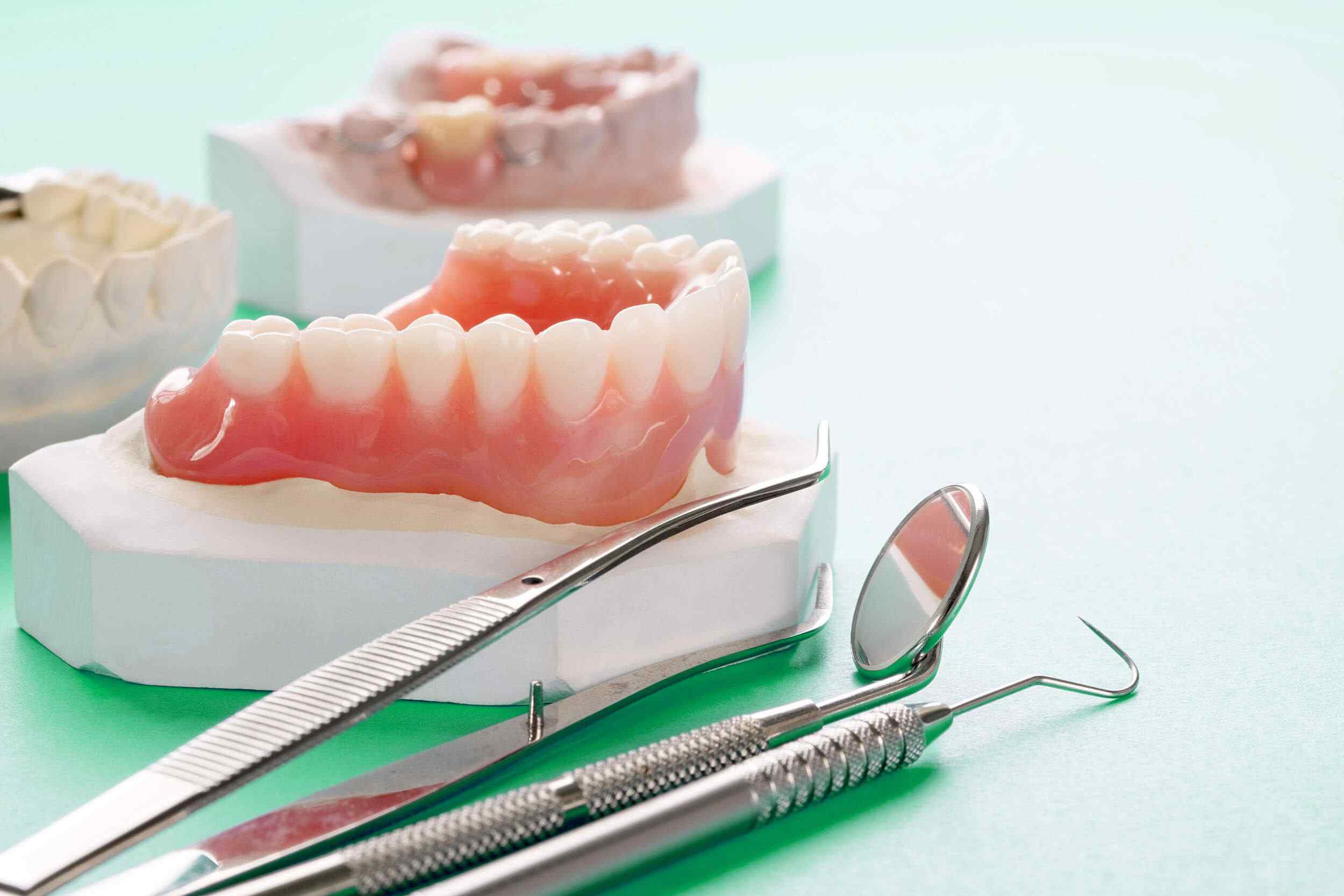Dentures offer a solution to those who have suffered the loss of one or more teeth.
In recent years, there have been great advances in the field of implantology that have led to an improvement in the quality of life of patients, leaving aside the uncomfortable removable complete dentures and gaining in safety and aesthetics.
What do we mean by dentures?
By dentures we mean the removable prosthesis typical of elderly people who have lost all the teeth of an arch. However, there are several types of dentures that improve the esthetics and functionality of our mouth.
Within the prostheses, we must make a first classification distinguishing between partial or complete dentures.
Partial dentures are those that replace only the missing teeth, preserving the part of the denture that is in perfect condition. An example of this would be dental bridges.
On the other hand, complete prostheses are those that replace all the dental pieces of an arch.
In addition, depending on their morphology, we can distinguish between mucosa-supported and mucodenture-supported prostheses.
Mucosal-supported prostheses are what we understand as traditional dentures. They are supported directly on the gingiva and the maxillary bone.
They are indicated for edentulous patients or those who have suffered almost total loss of the teeth of an arch. Thanks to the advances made in recent years, their esthetics are much more realistic.
Although it is the most economical method, it has major shortcomings:
Special care must be taken with what you eat and avoid, as far as possible, hard or sticky substances that are difficult to chew that threaten the attachment of the prosthesis.
It requires a period of adaptation to speak properly. It is particularly difficult to pronounce some sounds, especially those in which the tongue must rest on the palate or on the inside of the teeth.
Its stability is very reduced, especially that of the one placed in the lower arch. The sensation that the prosthesis is not fixed is very pronounced among people who wear dentures.
These prostheses are held in place by products such as fixative pastes or adhesive strips, although it is true that with the passage of time they lose their efficiency and can even alter the taste of food.
You will be interested in ” What is the process to place a dental implant?
Skeletal prostheses -or mucodenture-supported prostheses only replace the missing teeth. They are attached to the patient’s retained teeth by means of wires that surround the teeth.
Although they are more secure than removable prostheses, over time the teeth to which they are attached eventually become damaged.
Thanks to advances in the field of implant dentistry, the uncomfortable old removable dentures are a thing of the past.
How to adapt to a denture?
Initially, it requires a period of adaptation. We can take into account a series of recommendations to make this period more bearable such as:
Try to eat soft and easy to digest foods that do not force us to force chewing.
The fact of not pronouncing some sounds properly should not make us feel self-conscious. A good exercise is to read aloud to practice pronunciation and adapt more quickly to the presence of the prosthesis in the mouth.
If during the first few days the denture causes a sore or wound in the mouth, we should see a specialist as soon as possible. It is usual that the prosthetist must make some adjustments in the prosthesis, so that it fits perfectly in our jaw.
We will rely on the use of specific adhesives for dentures to ensure its fastening and avoid the appearance of sores.
We should not be alarmed if we secrete more saliva than usual, it is a normal symptom until our mouth gets used to the presence of the prosthesis.
To avoid possible infections, we must pay attention to the hygiene of our prosthesis.
Patient with removable dentures
Enlarge image
PATIENT WITH DENTURES
How to clean dentures?
Maintaining good care of your prosthesis is essential to avoid infections and other oral conditions. To do this, you must follow a series of guidelines regarding the hygiene of your dentures:
Wash your prosthesis with neutral soap and a nylon bristle brush specific for this case.
Put the prosthesis in a glass of water and add a product indicated for cleaning it. Keep it soaking for as long as the product manufacturer indicates. In this way, you will be sure to eliminate the bacteria that cause bad breath and inflammation of the gums.
Rinse the denture with cold water and dry it properly.
In addition, we must not forget to maintain a good hygiene of our mouth. If you wear a complete removable prosthesis, brush your gums with a soft bristle brush.
If, on the other hand, you wear a skeletal prosthesis, you should continue with your usual hygiene routine, brushing your teeth and gums properly with a soft-medium brush to remove food debris and bacteria that nest in your mouth.
Thanks to advances in the field of implantology, there are now prostheses on implants that offer great advantages over the classic removable denture.
What is a denture? What advances have there been in implantology?
What is implant rehabilitation?
It is a treatment for people who have suffered the loss of one or more teeth.
An implant is a titanium fixture that is integrated into the bone, replacing the root of the tooth. The prosthesis is screwed onto it.
Rehabilitation on implants is a great advance, since it facilitates chewing, the sensation of stability is total and, in addition, it does not represent such a great psychological burden for the person who wears it.
It is an alternative to removable or skeletal prostheses, which puts an end to the problems of subjection and discomfort associated with them. With implants, people feel the teeth as if they were their own, gaining in esthetics and confidence.
There are two types of implant prostheses: fixed and removable.
Fixed prosthesis on implants
Fixed prostheses can replace both lost teeth and the entire arch. It is indicated for people who have not suffered a great loss of bone.
We can distinguish different types of fixed prostheses depending on the number of teeth they replace. If it replaces only one tooth, we would be dealing with a dental implant; a bridge replaces several teeth and, finally, a hybrid prosthesis replaces a complete arch.
Removable prostheses on implants
Also known as overdentures, these are removable prostheses that are anchored on implants. The patient, besides being comfortable with the prosthesis, can remove it, favoring its cleaning.
The amount of bone and the arch on which it is placed will determine the number of implants required.
Extreme hygiene
Whichever method you choose to replace your missing teeth, it is necessary to follow a careful brushing routine at home and to attend the check-ups prescribed by the specialist.
What care does an implant prosthesis require?
Initially, we do not control the chewing force we exert on the implants. Therefore, it is advisable to follow a diet based on soft foods that do not pose difficulties when chewing.
In addition, we should visit the specialist periodically to check the condition of the implants and, in the case of fixed prostheses, to unscrew them so that they can be properly cleaned.
Hygiene is essential to ensure the duration of the treatment and to avoid possible problems such as infections, bad breath or inflammation of the gums.
Advances in the field of implant dentistry have led to great improvements in the quality of life of people who must wear a dental prosthesis. After an analysis of your case, our specialists will recommend the prosthesis that best suits your needs and your lifestyle.
If you have further questions regarding dental prostheses, we invite you to learn more about implantology treatments or to contact us.




